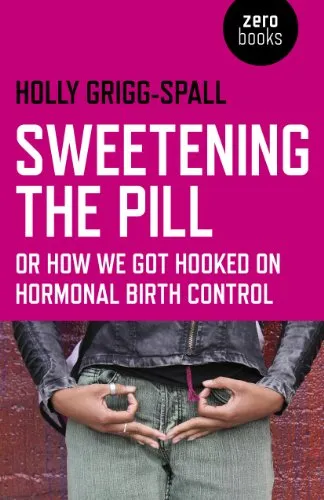Birth Control Blues: TikTok is pushing contraceptive skepticism, but are influencers getting the science right?
Bronwyn Rideout - 15th September 2025
It has been a bad week for anyone who takes a birth control pill as a contraceptive or an abortifacient. Well, specifically a bad week for people in America or whose health care is impacted by the decisions of the President of the United States.

Pregnant people in Texas seeking an abortion by either procuring or seeking out abortion pills (misoprostol and mifepristone) cannot be sued, but a new bill, HB 7, enables private citizens to sue abortion pill providers and manufacturers. So, anyone who helps a pregnant person access such medications (i.e. a doctor, relative, or organisation) is fair game. With many in Texas having the medications mailed into the state, and maybe even stock-piling to help others in the community, the impact of this bill will surely extend beyond the Texas border. Further, the bill includes what some call a “bounty hunter” provision that provides a financial reward for someone who launches a lawsuit who isn’t involved with a pregnancy.
Jessica Yu of the Texas Tribune outlines the payment structure:
“Anyone can bring a lawsuit. If they win, plaintiffs can get at least $100,000 from the defendant if they are related to the fetus. If they are not, they can only receive $10,000 and would have to donate the rest of the money to a charity or nonprofit. The charity of their choosing, however, cannot be one that they or their family members receive a salary or any financial benefits from.”
How generous. I wonder if Planned Parenthood is an acceptable charity.
Yu also reports that HB 7 is another law that seeks to weaken or overcome shield laws: “…legal protections for patients, health care providers, and people assisting in the provision of certain health care in states where that care is legal from the reach of states with civil, criminal, and professional consequences related to that care”. So far, Yu adds, attempts to prosecute doctors located in states where abortion is legal has not worked. But for supporters of HB 7, they won’t be measuring the success of this bill by the number of lawsuits - they’re banking on the bill and its consequences as being enough of a deterrent. Their confidence isn’t unwarranted as a preceding senate bill, SB 8 (or the “heartbeat bill”), has similarly accumulated minimal lawsuits.
But that hasn’t stopped the Texas Attorney General from attempting to sue both a New York-based doctor for prescribing pills to a Texas resident, and the county clerk who twice refused to file a six-figure judgement against said doctor, citing New York’s own shield laws. New York’s Attorney General, Letitia James, is intervening on behalf of the doctor and the clerk, arguing that Texas cannot impose its laws in New York.

New York Attorney General Letitia James
California has taken a different approach. Another state with shield laws in place, Assembly Bill 260 takes those protections further by allowing mifepristone and other abortion-related medications to be dispensed without including the patient’s, prescriber’s, or pharmacy’s names on the label. Also, while pharmacists are still expected to maintain records of this dispensing, such logs are “… inaccessible to law enforcement without a subpoena, and prohibits sharing information with entities from other states”. The bill has recently been submitted to Governor Gavin Newsom, and is awaiting approval.
On a global scale, the fate of nearly $10 million in unused contraceptives hangs in the balance. Approximately one month ago, NPR reported that the State Department planned to destroy the stock intended for distribution to women in low-income countries in Africa under USAID, the United States Agency for International Development. USAID was one of many government organisations to be undermined and gutted by the Trump administration earlier in the year, and since then the product has been hanging out in Belgium. What makes this situation especially disheartening is that there is no legitimate reason for this stockpile to be destroyed. Expiry dates range from 2027 to 2031, and charities (American or otherwise) have offered to purchase or accept donations of contraceptives in a way that would have allowed the US government to not only avoid costs, but also recoup taxpayer funds.

The Geel, Belgium warehouse where almost $10 million in contraceptives is being stored.
Instead, these offers have been denied and the stockpile is currently stored in less-than-ideal storage conditions in Belgium as USAID activities wound down. The story got hot this weekend with a report by the New York Times on September 11th that claimed that the contraceptives were finally destroyed. This was walked back on September 12th when it was confirmed that nothing had been destroyed yet. A possible hurdle that must be cleared before the US can dispose of it is that Flanders has a law against the incineration of still-usable medical products, and special permission is needed before the US can proceed. It was also suggested that the incineration might occur in France, but even this cannot happen without a formal derogation from Flanders. Activists and politicians in France have been advocating their government to refuse any incineration requests. If incineration occurs, it will cost the US government over $160,000.
Note, not all items from the USAID stock are being destroyed, and some will go on to their intended users - in particular, HIV medications and condoms. Pills and various forms of implantable birth controls like IUDs are believed to be targeted because they are described by the US government as abortifacient commodities. If readers are familiar with the Mexico City Policy, then this stance is sadly unsurprising. Also known as the global gag rule, the Mexico City Policy blocks funding to NGOs if they provide any form of abortion services or education. The policy was implemented by Ronald Regan in 1984 and, since then, Republican presidents maintain or reinstate it while democratic presidents rescind it. Such policies are devastating and life threatening because medications like misoprostol, which is used for abortions, are also used to stop serious bleeding after a baby is born alive. In high-resource countries like New Zealand, misoprostol is popular to help induce labour at term, but it is a 3rd or 4th-line intervention during postpartum haemorrhages. In low-resource countries, where refrigeration, availability of skilled medical practitioners, or access to water for injection or saline is not guaranteed, misoprostol tablets are a critical first-line intervention which can be easily stored, transported, and administered with minimal training.
Amidst these stories about the tenuous nature of reproductive choice and autonomy worldwide, I had a tremendous case of whiplash when I read Emma Goldberg’s article in the New York Times about young women who are being easily influenced to abandon birth control. Goldberg follows Ashley Hamrick, a then 26-year-old who had been on the pill since she was a teen. While she had no complaints or side effects, her social media feed was full of influencers saying that their mental wellbeing improved when they stopped taking a daily oral contraceptive.
And, well, the influencers were good at influencing, as Hamrick decided to stop birth control - against her doctor’s advice. Hamrick quickly became pregnant, and in under a year after coming off her birth control she had a baby. As a new resident of Texas, Hamrick was unnerved by the changes made to reproductive care in her state, and how they could negatively impact her. She struggled with isolation during the early postpartum period, and is now back on the pill due to her desire to not get pregnant again.
Goldberg’s sampling of bad internet birth control advice practically sent me back to the one year I attended a Catholic high school, where the health/religion teacher confidently told the class about how the pill made her friend infertile.
“Alex Clark, the popular Turning Point USA podcaster, has suggested that the way women are prescribed birth control is indirectly linked to “major fertility issues” (because of the underlying health issues it might mask), or that birth control can change who women are attracted to (“whispers the birth control pill can falsely make women feel bisexual,” Ms. Clark posted on X), which doctors say is untrue. In an appearance on Joe Rogan’s show, Calley Means, now an adviser to Health Secretary Robert F. Kennedy Jr., said that the medical industry views birth control as “recurring revenue”: “Oh interesting,” Mr. Means said with a conspiratorial lilt. “You can actually convince someone to take a pill for years, for almost most of their life.”

I’m not denying that the side effects of birth control are very real, and some of us may remember a scare around the risk of blood clots associated with the combined oral contraceptive pill. I also don’t disagree that many go on birth control as teens without fully understanding those side effects. However most of the more extraordinary claims being made are not being supported with evidence. Interestingly, one of the sillier claims, that the pill can change who you are attracted to, is based on actual research - albeit nothing as ridiculous as artificially making you bisexual. Many may be familiar with the smelly t-shirt test of Swiss Zoologist Claus Wedekind. Wedekind’s 1995 study found that women preferred the scent of t-shirts worn by men with different Major Histocompatibility Complex (MHC); however, subjects on birth control tended to prefer t-shirts worn by men with similar MHC. Subsequent studies haven’t fully replicated Wedekind’s research, and the findings are mixed. Attraction is incredibly complicated, and not limited to smell alone - a 2018 study looking into preferences with facial masculinity found that women preferred masculinised over feminised versions of men’s faces, and that there was no evidence that oral contraceptive use decreased those preferences.
Nevertheless, Hamrick’s observations about her path to being influenced is a phenomenon that is currently being studied. A 2025 study from La Trobe analysed 100 videos with regard to who the creator was (medical professional, lay person, online company, hormonal health coach), the contraceptive method being discussed, whether the advice was to reject or accept hormonal birth control, and if distrust in either contraceptives or health providers was noted. A 2024 study that analysed TikTok videos about user experiences with IUDs found similar levels to the 2025 study regarding distrust of healthcare professionals and low quality of information. Still, there is an opportunity for healthcare professionals to address issues of pain and informed consent identified in the 2024 study.
Unsurprisingly, there is considerable conservative investment in pushing out pill-skepticism, with Goldberg noting that conservative magazines and even Peter Theil are funding period-tracking apps, which is presented as an alternative. I wrote about the controversies around femtech and period tracking apps back in 2022, in the immediate aftermath of the repeal of Roe vs. Wade. At the time, concern centred on whether law enforcement could demand access to any data connected with such applications.
Now, it appears a very different wolf made it into the hen house - although they would like you not to notice the man behind the curtain.
“Ms. Clark insists that her anti-birth control discussions aren’t connected to the pronatalist messaging of Turning Point USA, or her boss there: “The Charlie Kirks of the world are out here being like, ‘You need to have babies and get married younger.’ Then you’ve got me, who works for him, saying, ‘You need to be questioning birth control.’ They’re totally unrelated. All women in general should be questioning the pill.”
Unfortunately for Clark, many conservative public figures would find the approaches of Clark and the late Charlie Kirk aligned.

Lindsay Beyerstein wrote a decent critique of the book for Slate in 2013 that is worth a read even today:
“If capitalism, medicine, and feminism sound like strange bedfellows, that’s because they are. Grigg-Spall makes a series of seemingly contradictory claims about the capitalist-medical-feminist bloc that is supposedly bullying women into taking the pill: 1) The pill is popular because it turns women into emotionally stable and industrious workers who never miss a day of work or bleed on the shop floor and because the economy needs women’s “passivity, anxiety and emotionality.” 2) The pill is the modern-day equivalent of the 19th-century practice of “female castration,” which was used to desexualize women, and the pill is promoted as part of a feminist scheme to make women more alluring and available to men. 3) The pill kills female libido, and the pill fuels the supposed epidemic of sluttiness known as “raunch culture.”
Does the pill masculinize, ultrafeminize, or unsex women entirely? Grigg-Spall claims all of the above!.”
Still, there may be some hope. Anti-pill doesn’t always mean anti-birth control outright. Goldberg reported that while pill use dropped, IUD insertions rose for women who had private insurance coverage. Birth control users should be informed consumers of health care, and absolutely should have the freedom to experiment with birth control until they find the method that works for them. The issue is not about people becoming better informed about their bodies and engaging in self-advocacy, but that the pull of misinformation is strong, and systemic struggles with healthcare mean that scammers and pundits face little resistance.
Regardless of which side of the political divide the anti-pill message is coming from, social media has allowed this message to reach a whole new audience. This time, it can just as easily and quietly overlap with wellness influencers and crunchy moms as it does with cottage core or tradewife content. The problem remains that in a time where reproductive rights and access to such medications are threatened, damaging legislative changes may be expedited because social media has made a generation of young people ambivalent about, or even afraid of, the pill.